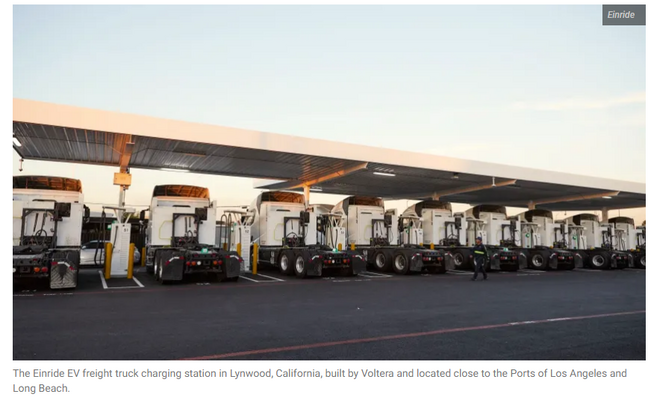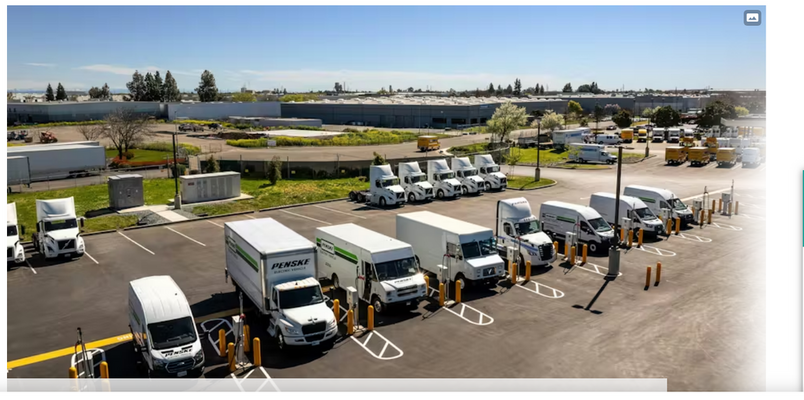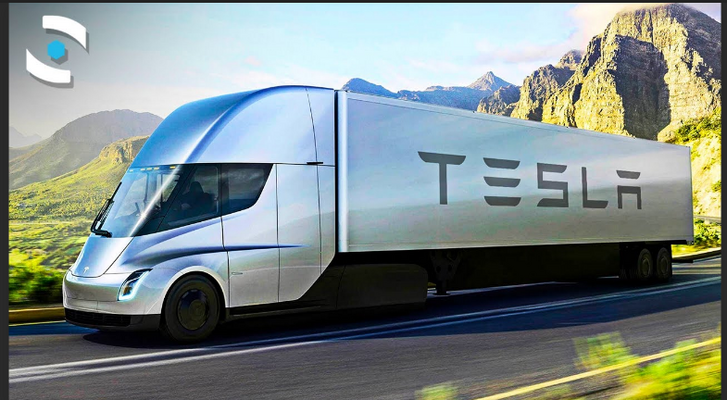You are using an out of date browser. It may not display this or other websites correctly.
You should upgrade or use an alternative browser.
You should upgrade or use an alternative browser.
Truck EV charging
- Thread starter DonTom
- Start date
The friendliest place on the web for anyone with an RV or an interest in RVing!
If you have answers, please help by responding to the unanswered posts.
If you have answers, please help by responding to the unanswered posts.
Mark_K5LXP
Well-known member
I see a lot of expensive hardware just sittin' there.
Mark B.
Albuquerque, NM
Mark B.
Albuquerque, NM
Skookum
Well-known member
- Joined
- Dec 19, 2018
- Posts
- 3,674
What's one tank of diesel cost in a heavy truck? They carry what, 100-150 gallons of fuel and get about 6mpg?
Let's say roughly $400 to go 600 miles when diesel is $4.00/gallon? Ouch. 600 miles in a fully day of driving, roughly? SO, $400 per day in fuel? Double ouch.
There's a big future in heavy duty EV's if batteries can get there.
Let's say roughly $400 to go 600 miles when diesel is $4.00/gallon? Ouch. 600 miles in a fully day of driving, roughly? SO, $400 per day in fuel? Double ouch.
There's a big future in heavy duty EV's if batteries can get there.
DonTom
Well-known member
Yep. Just as we do at rest stops, truck stops, etc.I see a lot of expensive hardware just sittin' there.
-Don- Reno, NV
I can see this being a plus for the drivers. Hook up and head off to lunch for 45 minutes or an hour. They don’t need to stay with the truck while it’s fueling. There is a local company from a few towns away that uses 5 ton Lion trucks for deliveries in the valley. We sometimes see them at the local charger around lunch while driver is off having lunch at Tim Hortons. They come back, unhook and they are off.I see a lot of expensive hardware just sittin' there.
Mark B.
Albuquerque, NM
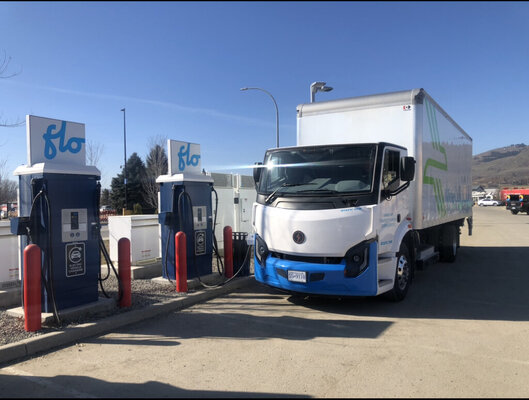
Here’s a different approach for trailer charging. This is in a provincial park so they couldn’t get access to the green space in front to make it drive thru…(or at least not yet). But double staggered charge islands. Nose in and back out. And it will work with any charge port configuration. I’ll take it.
12 x Tesla V3 superchargers.
4 x BC hydro 180 kw chargers
1 x BC hydro 50 kw charger.
They literally just opened YESTERDAY. We camp near there in one of the provincial campgrounds. We’ll be using these later this summer. Nice addition. Up till now the only one there was the 50 KW machine.
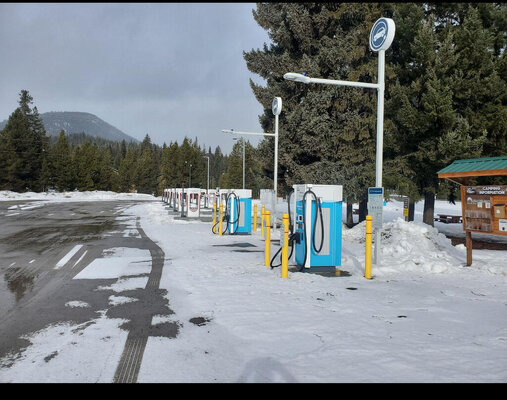
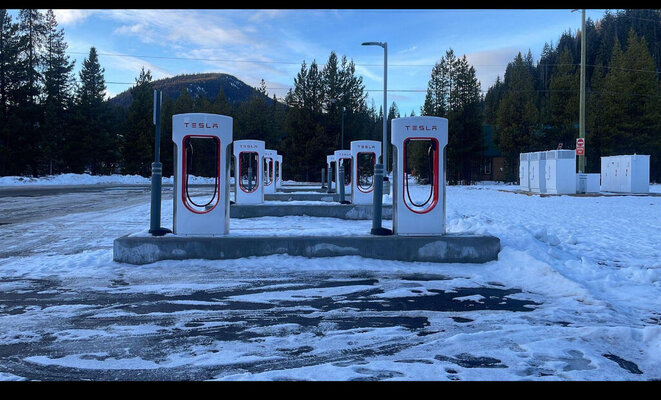
12 x Tesla V3 superchargers.
4 x BC hydro 180 kw chargers
1 x BC hydro 50 kw charger.
They literally just opened YESTERDAY. We camp near there in one of the provincial campgrounds. We’ll be using these later this summer. Nice addition. Up till now the only one there was the 50 KW machine.


DonTom
Well-known member
I don't know about up there in Canada, but here in the USA professional truck drivers are only allowed to drive 11 hours per 24-hour day. Strictly enforced. This means they have 13 hours per day to charge up with no negative effect on where they are going.I can see this being a plus for the drivers.
USA truck driving laws.
-Don- Reno, NV
Yah. No idea Don. Probably something similar.I don't know about up there in Canada, but here in the USA professional truck drivers are only allowed to drive 11 hours per 24-hour day. Strictly enforced. This means they have 13 hours per day to charge up with no negative effect on where they are going.
USA truck driving laws.
-Don- Reno, NV
DonTom
Well-known member
Canada is just a little looser. My anti-virus said there was a virus in the link, so I will not post the link here, but here is what the text said:Yah. No idea Don. Probably something similar.
"HOURS OF SERVICE
Canadian and American HOS rules have some differences and if a driver travels across borders, they need to comply with the rules of each jurisdiction.
Canadian Hours of service-
- The letter of the law implies that a driver may drive for 13 hours in a 16-hour On-duty shift (including both on-duty driving and on-duty not driving) followed by a minimum of 8 consecutive hours of off duty.
- Cycle 1 includes a maximum of 70 hours on duty in 7 days period. No driving is allowed after completing 70 hrs on duty in a 7-day cycle.
- Cycle 2 includes a maximum of 120 hours on duty in 14 days period. No driving is allowed after completing 120 on-duty hours in a 14-day cycle. Also, after completing 70 hours on duty, one must take 24 consecutive hours off duty.
- In a period of every 14 days, one must take 24 consecutive hours off duty.
You must state which cycle you are using every day in your logbook and if you wish to switch the cycles, you must reset first.
To reset HOS to zero in a 7-day cycle, you need 36 consecutive hours off duty
To reset HOS in a 14-day cycle, you need 72 consecutive hours off duty.
In terms of daily driving, after completion of 16 on-duty hours from the most recent break of 8 off-duty hours, no driving is allowed.
In Canada, a commercial truck driver must stop driving after 70 hours over 7 consecutive days, or 120 hours over 14 consecutive days.
AMERICAN HOS
In America, there are stricter rules regarding truck driving.
-Don- Reno, NV
Derby6
Well-known member
I’m not an expert but know a bit about the trucking industry.
- it will be far from a few years before we see that readily available from E-RVs
- 11 hours sounds right. 15 driving hours in AK; 20 total hours on the clock. 10 hour rest required. 36 hour Resets required as well. (Weekly I think.). Batteries need to go for the 11-15 hours with a load and then charge in the 10 hours. Time is money, can’t stop every 4-6 hours for a charge. Drivers still losing hours. There is huge negative effects.
- it will be far from a few years before we see that readily available from E-RVs
- 11 hours sounds right. 15 driving hours in AK; 20 total hours on the clock. 10 hour rest required. 36 hour Resets required as well. (Weekly I think.). Batteries need to go for the 11-15 hours with a load and then charge in the 10 hours. Time is money, can’t stop every 4-6 hours for a charge. Drivers still losing hours. There is huge negative effects.
DonTom
Well-known member
You're probably correct there. I am too old to wait around for it.- it will be far from a few years before we see that readily available from E-RVs
But seeing all the 18-wheeler EV trucks around here makes me think it could be sooner than I expect.
Driving a heavy rig for 4-6 hours nonstop is rather dangerous, IMO. But I noticed even a short stop such as a stop at a gas station to fill up helps a lot. But filling up my 80-gallon RV gas tank takes enough time for a decent break.. Time is money, can’t stop every 4-6 hours for a charge.
A 3.75 million-watt fast charge won't be that much longer. If I could use that on my Telsa, it would take about one minute for a full charge from empty. But about 1 second for the battery to blow up!
-Don- Reno, NV
Derby6
Well-known member
Think bigger. Those are all daycab trucks. Local deliveries and there and back. Fine for you in auburn and Reno.
Most of the states, world, and folks require long line haul and heavy haul. It’s not an RV excursion. Need to get from ports to the masses in real time. Not sitting at a charger trying to keep goods at a controlled temperature or infrastructure taking 3,4 maybe 10 times as long to build awaiting equipment, machinery and the supplies needed to complete.
In edit. Oh and most all drive about 4-6 hours non stop. Quick stop at that 2-6 hour point. Depends on driver. Grab a bite, stretch, check load, use bathroom and move on.
Most of the states, world, and folks require long line haul and heavy haul. It’s not an RV excursion. Need to get from ports to the masses in real time. Not sitting at a charger trying to keep goods at a controlled temperature or infrastructure taking 3,4 maybe 10 times as long to build awaiting equipment, machinery and the supplies needed to complete.
In edit. Oh and most all drive about 4-6 hours non stop. Quick stop at that 2-6 hour point. Depends on driver. Grab a bite, stretch, check load, use bathroom and move on.
DonTom
Well-known member
Derby6
Well-known member
Exactly what I’d expect. Minimal quote. And Insert a made up picture while still not really understanding the trucking long haul industry and what it means to the world and this country.
DonTom
Well-known member
DonTom
Well-known member
I don't claim to know anything about trucking. But the Tesla Truck is working out okay for some, even if not all.And Insert a made up picture while still not really understanding the trucking long haul industry and what it means to the world and this country.
It's the first EV 18-wheeler truck, we shouldn't expect it to work for every possible use. At least not yet.
-Don- Reno, NV
John From Detroit
Well-known member
Radio friend of mine drives in Canada but as it's already been addressed I will not talk about the legal diferences.I don't know about up there in Canada, but here in the USA professional truck drivers are only allowed to drive 11 hours per 24-hour day. Strictly enforced. This means they have 13 hours per day to charge up with no negative effect on where they are going.
USA truck driving laws.
-Don- Reno, NV
He used to drive international with his wife as co-driver.. Save for meal stops they ran 24x7 as with an hour tx a day for breakfast/supper One drove days. one nights.
Skookum
Well-known member
- Joined
- Dec 19, 2018
- Posts
- 3,674
Much of the trucking industry is a race to the bottom in terms of wages and benefits. The industry is licking its chops for a way to get out from under fuel and labor costs. Either by reducing the price of fuel by whatever means possible or removing the necessity of a human holding the steering wheel. Not that a decent wage can't be made in trucking, but that's the exception nowadays than the norm. "When" the technology gets there, there is a market for it. Some of the niche industry may survive, sure. But sending cans up and down a trucking lane will probably the first to be electrified and/or automated in some form.
Last edited:
Derby6
Well-known member
That video says nothing. 1 was a heavy load on lowboy. Who knows what the electric truck or other truck was hauling.
(Empty or potato chips vice pallets of metal stuff???)
At end of video you see another fuel burning truck following electric on right up the center lane.
(Empty or potato chips vice pallets of metal stuff???)
At end of video you see another fuel burning truck following electric on right up the center lane.
Derby6
Well-known member
Some truth there but like you also said, I know many making good wages and benefits driving truck.Much of the trucking industry is a race to the bottom in terms of wages and benefits.

